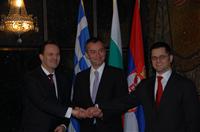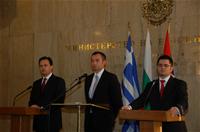In 2014 the Western Balkans to receive an EU accession date
Adelina Marini, December 14, 2010
 While I was watching on Saturday (December 10th) the ministers of foreign affairs of Bulgaria, Greece and Serbia I thought that it is not impossible for the Balkans to leave the black hole in which they are for centuries. Three young, well educated and perfectly English-speaking foreign ministers looked as though they were friends from school - easy-going, laughing, unburdened by the ideologies of the past. Nikolay Mladenov, Dimitris Droutsas and Vuk Jeremic met in Sofia to initiate a new form of cooperation, aimed at giving support for the European integration of the countries in the Western Balkans.
While I was watching on Saturday (December 10th) the ministers of foreign affairs of Bulgaria, Greece and Serbia I thought that it is not impossible for the Balkans to leave the black hole in which they are for centuries. Three young, well educated and perfectly English-speaking foreign ministers looked as though they were friends from school - easy-going, laughing, unburdened by the ideologies of the past. Nikolay Mladenov, Dimitris Droutsas and Vuk Jeremic met in Sofia to initiate a new form of cooperation, aimed at giving support for the European integration of the countries in the Western Balkans.
Greece and Bulgaria as being members of the European Union want to help Serbia fulfill perfectly the membership criteria, by sharing both the good and the bad things from their participation in the European community. The Bulgarian first diplomat for a second time within a month defined the three main criteria for membership of the countries in the Western Balkans in the EU - implementation of the conditions of the European legislation, regional cooperation and good neighbourly relations. Words like Kosovo, Ratko Mladic and the International Tribunal for War Crimes in Former Yugoslavia were not mentioned.
The three have signed a joint declaration of commitment to work together in support of the European integration of the Western Balkans. In the basis of the document is the support for Serbia's membership application based, however, on its continuous, consistent and irreversible progress in economic and political reform. Such a support will be expressed by sharing expertise in the area of European integration and in promoting Agenda 2014 - an initiative aimed at promoting and mobilising the aspirations for EU membership.
Agenda 2014 has been developed during the Greek Presidency of the European Union in 2003. Then at the popular as a Thessaloniki summit Greece proposed the Agenda as a basic framework for Western Balkan's integration in the EU. 7 years later and from Sofia Greek foreign minister Dimitris Droutsas laid out his idea for a continuation of this initiative into Thessaloniki II. He said that it was absolutely possible in 2014, when Greece will again preside over the Union, a concrete date to be proposed for the accession of the countries in the Western Balkans in the EU.
Around a month ago Mr Droutsas proposed this idea for the first time during a seminar in Brussels by even announcing the date 2018 as a realistic one for the accession of some Western Balkan countries. He added that currently there is a new momentum, a new dynamism in the EU with regard to the Western Balkan's accession process. "Now we need a second step to do something more to achieve a concrete substance to this initiative of the Agenda 2014. And in this respect I had the opportunity to say [during the meeting in Sofia] that Greece will be exercising the presidency of the EU in 2014 and our aim is to have during this presidency a summit meeting of the Balkan countries .... and there we would like to have a concrete date for the EU accession of all the countries of the Western Balkans".
The symbolism of 2014 and 2018
Here is how the three ministers responded to euinside's questions how realistic it was in 2014 a concrete accession date to be proposed and also how realistic the year 2018 would be for an accession, and whether Serbia would be capable of solving all its problems by then, including to arrest and hand over Ratko Mladic to the International Tribunal in the Hague:
Dimitris Droutsas: "In the Agenda 2014 the date of 2014 was chosen also for symbolic reasons - it's 100 years after the beginning of WWI and we thought that this is a good initiative, that it is a good symbolism to say that we need to restart this very important project of the further EU enlargement to the Western Balkans. Now you mentioned 2018. I have mentioned this also in previous speech, yes, 2018 could be such a date. Again it is a very symbolic date - it is 100 years after the end of WWI, so, again, full of symbolism. [...] I understand that in 2018 Bulgaria is exercising the EU Presidency for the first time. So what could be a better omen than this".
Vuk Jeremic: "We fully embrace the idea of Greece about the Thessaloniki II summit to be held in 2014 and we very much hope that a date can be decided by then. Of course it is going to depend a lot to the dynamics and about the developments inside the region, inside Europe in general and the world at large, but we are certainly going to do everything that is in our power. [...] And in terms of symbolism is something that Dimitris is mentioning but I stick to 2014 for the moment of time when this date can be announced. Let's not talk about dates before then".
Nikolay Mladenov: "I think the symbolism of 2014-2018 is quite clear to  everyone. 2011 will be indeed a key year because this will be the year in which we will see, I hope, all countries in the Western Balkans make at least one step forward to moving closer to accession. We very much look forward to the completion of the questionnaire on Serbia's application and the opening of negotiations. We look forward to Montenegro receiving candidate status for EU membership. We very much look forward to the fact that most people in the Western Balkans as of January next year will be able to travel visa-free to the EU".
everyone. 2011 will be indeed a key year because this will be the year in which we will see, I hope, all countries in the Western Balkans make at least one step forward to moving closer to accession. We very much look forward to the completion of the questionnaire on Serbia's application and the opening of negotiations. We look forward to Montenegro receiving candidate status for EU membership. We very much look forward to the fact that most people in the Western Balkans as of January next year will be able to travel visa-free to the EU".
The fact that the three ministers spoke of symbolism in the context of the so painful events from World War I maybe indeed is a symbol of the fact that, after all it is not impossible the centuries-long conflicts in the region to be overcome. Hope gives also the fact that with every next generation the attitude towards the past would be different. In support of this hope the three first diplomats called each other friends and their relations indeed seemed easy-going.
When the time came for them to sign the joint declaration, be it because of a mistake of the protocol or for another reason but the three were bewildered how to exchange the copies, so that all three of them could sign all the three copies. A very nice confusion happened, which ended with laughter and a swift exchange of copies. After all the past is a past which is good to be known but should not form the future. As Nikolay Mladenov said too - the people in the Western Balkans want peace, stability, enjoy their families, go shopping and celebrate. Why stopping them do that just because of past mistakes?
 Bakir Izetbegovic, Andrej Plenkovic | © Council of the EU
Bakir Izetbegovic, Andrej Plenkovic | © Council of the EU Aleksandar Vucic, Recep Tayyip Erdogan | © Serbian Presidency
Aleksandar Vucic, Recep Tayyip Erdogan | © Serbian Presidency Jean-Claude Juncker, Zoran Zaev | © European Commission
Jean-Claude Juncker, Zoran Zaev | © European Commission